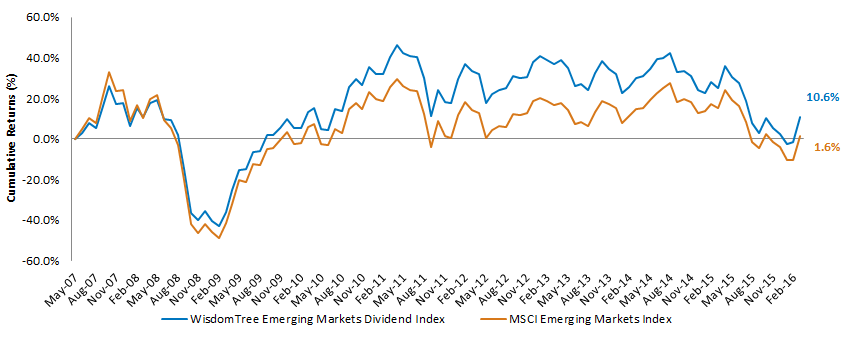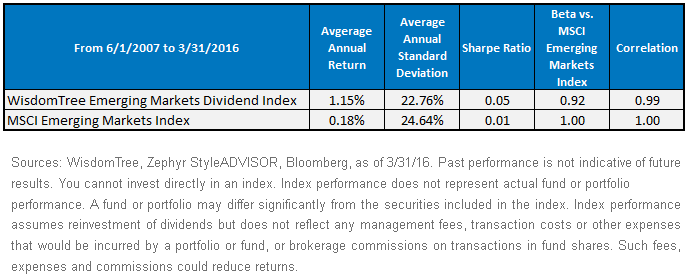WisdomTree Launches Its Broadest Option in Emerging Market Equities


 Average Annual Returns
Average Annual Returns
 Broad Exposure
If asked to identify two core principles by which the WisdomTree Emerging Markets Dividend Index is guided, we would emphasize the broadness of exposure and relative value rebalance.
At its most recent screening date, September 30, 2015, the WisdomTree Emerging Markets Dividend Index had 1,328 qualifying constituents—a very broad cross-section of emerging market dividend payers, with a total market capitalization of more than $6.0 trillion. Interestingly, measuring by number of constituents, this is actually broader than the MSCI Emerging Markets Index, which had 837 constituents as of that date.3
Disciplined Focus on Fundamental Value
Our annual rebalancing process refreshes Index constituent weights based on the concept of relative value. At the annual rebalance, each constituent’s weight, instead of being based on its market cap, is based on its share of all the cash dividends paid by all the companies in the Index. As a practical matter, this means constituent weights change at the rebalance based on each stock’s relative price appreciation compared to its relative dividend growth.
Tilting Index weights toward companies that pay larger dividends raises the dividend yield of the entire index. The dividend yield of the WisdomTree Emerging Markets Dividend Index stood at 4.7% as of March 31, 2016, almost 2 full percentage points higher than that of the MSCI Emerging Markets Index 4.
Introducing the WisdomTree Emerging Markets Dividend Fund (DVEM)
The WisdomTree Emerging Markets Dividend Fund (DVEM), which is designed to track the WisdomTree Emerging Markets Dividend Index, offers investors:
• The opportunity to gain broad, core exposure to emerging market equities in an ETF with a competitive expense ratio
• The potential to generate higher returns with lower volatility than comparable capitalization-weighted strategies
• The potential to derive greater dividend income from an emerging market exposure through WisdomTree’s proprietary dividend-weighting methodology
Interested in this strategy? Listen to the Dividend Approach to Emerging Markets Podcast.
1Source: Bloomberg, with data from 6/1/07 to 3/31/16.
2Source: Bloomberg.
3Sources: Standard & Poor’s, Bloomberg, with data as of the WisdomTree annual screening date, 9/30/15.
4Source: Bloomberg, with data as of 3/31/16.
Broad Exposure
If asked to identify two core principles by which the WisdomTree Emerging Markets Dividend Index is guided, we would emphasize the broadness of exposure and relative value rebalance.
At its most recent screening date, September 30, 2015, the WisdomTree Emerging Markets Dividend Index had 1,328 qualifying constituents—a very broad cross-section of emerging market dividend payers, with a total market capitalization of more than $6.0 trillion. Interestingly, measuring by number of constituents, this is actually broader than the MSCI Emerging Markets Index, which had 837 constituents as of that date.3
Disciplined Focus on Fundamental Value
Our annual rebalancing process refreshes Index constituent weights based on the concept of relative value. At the annual rebalance, each constituent’s weight, instead of being based on its market cap, is based on its share of all the cash dividends paid by all the companies in the Index. As a practical matter, this means constituent weights change at the rebalance based on each stock’s relative price appreciation compared to its relative dividend growth.
Tilting Index weights toward companies that pay larger dividends raises the dividend yield of the entire index. The dividend yield of the WisdomTree Emerging Markets Dividend Index stood at 4.7% as of March 31, 2016, almost 2 full percentage points higher than that of the MSCI Emerging Markets Index 4.
Introducing the WisdomTree Emerging Markets Dividend Fund (DVEM)
The WisdomTree Emerging Markets Dividend Fund (DVEM), which is designed to track the WisdomTree Emerging Markets Dividend Index, offers investors:
• The opportunity to gain broad, core exposure to emerging market equities in an ETF with a competitive expense ratio
• The potential to generate higher returns with lower volatility than comparable capitalization-weighted strategies
• The potential to derive greater dividend income from an emerging market exposure through WisdomTree’s proprietary dividend-weighting methodology
Interested in this strategy? Listen to the Dividend Approach to Emerging Markets Podcast.
1Source: Bloomberg, with data from 6/1/07 to 3/31/16.
2Source: Bloomberg.
3Sources: Standard & Poor’s, Bloomberg, with data as of the WisdomTree annual screening date, 9/30/15.
4Source: Bloomberg, with data as of 3/31/16. Important Risks Related to this Article
Dividends are not guaranteed, and a company currently paying dividends may cease paying dividends at any time.
There are risks associated with investing, including possible loss of principal. Foreign investing involves special risks, such as risk of loss from currency fluctuation or political or economic uncertainty. Investments in emerging or offshore markets are generally less liquid and less efficient than investments in developed markets and are subject to additional risks, such as risks of adverse governmental regulation and intervention or political developments. Heightened sector exposure increases the Fund’s vulnerability to any single economic, regulatory or other development impacting that sector. This may result in greater share price volatility. The Fund invests in the securities included in, or representative of, its Index regardless of their investment merit, and the Fund does not attempt to outperform its Index or take defensive positions in declining markets. Due to the investment strategy of this Fund, it may make higher capital gain distributions than other ETFs. Please read the Fund’s prospectus for specific details regarding the Fund’s risk profile.

Christopher Gannatti began at WisdomTree as a Research Analyst in December 2010, working directly with Jeremy Schwartz, CFA®, Director of Research. In January of 2014, he was promoted to Associate Director of Research where he was responsible to lead different groups of analysts and strategists within the broader Research team at WisdomTree. In February of 2018, Christopher was promoted to Head of Research, Europe, where he was based out of WisdomTree’s London office and was responsible for the full WisdomTree research effort within the European market, as well as supporting the UCITs platform globally. In November 2021, Christopher was promoted to Global Head of Research, now responsible for numerous communications on investment strategy globally, particularly in the thematic equity space. Christopher came to WisdomTree from Lord Abbett, where he worked for four and a half years as a Regional Consultant. He received his MBA in Quantitative Finance, Accounting, and Economics from NYU’s Stern School of Business in 2010, and he received his bachelor’s degree from Colgate University in Economics in 2006. Christopher is a holder of the Chartered Financial Analyst Designation.

